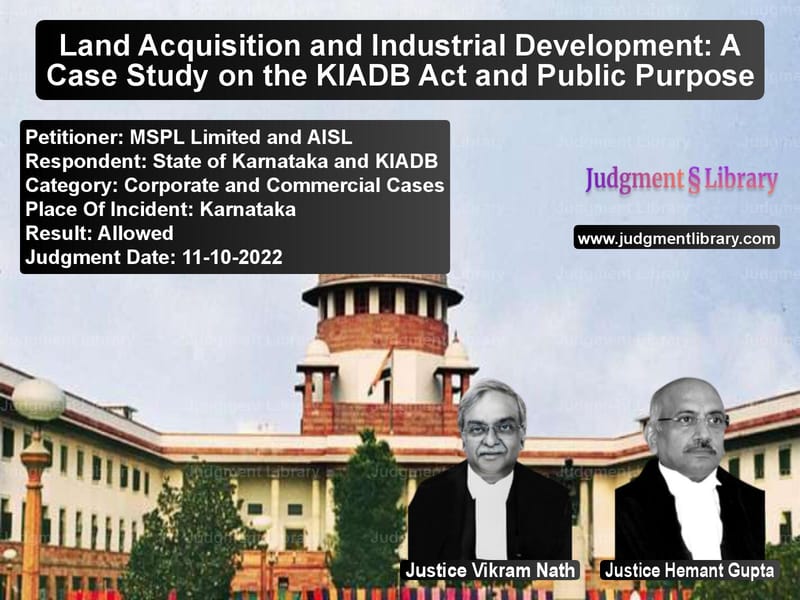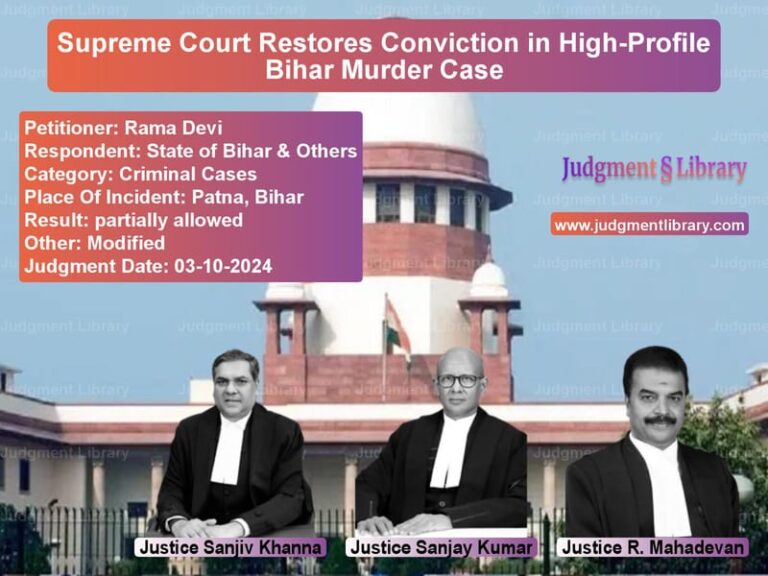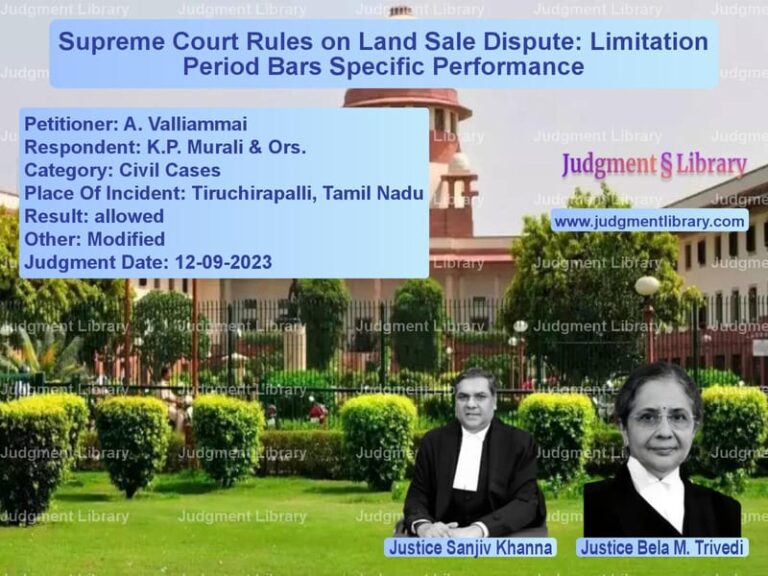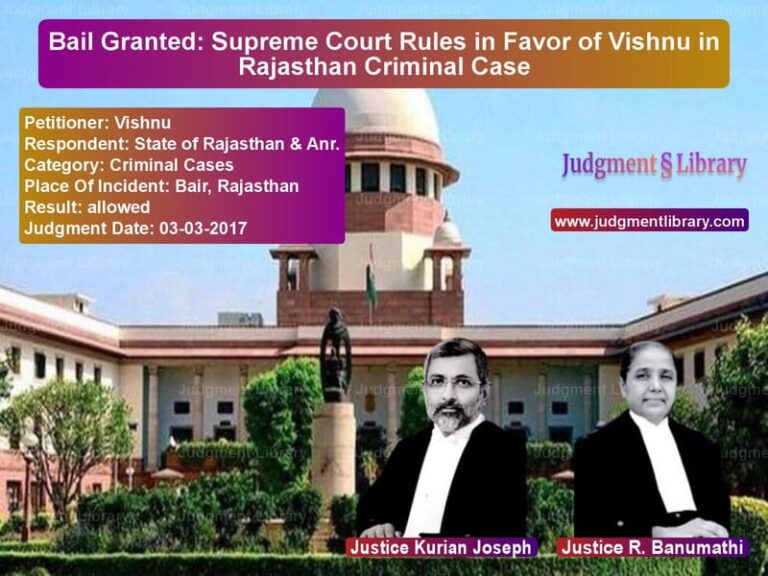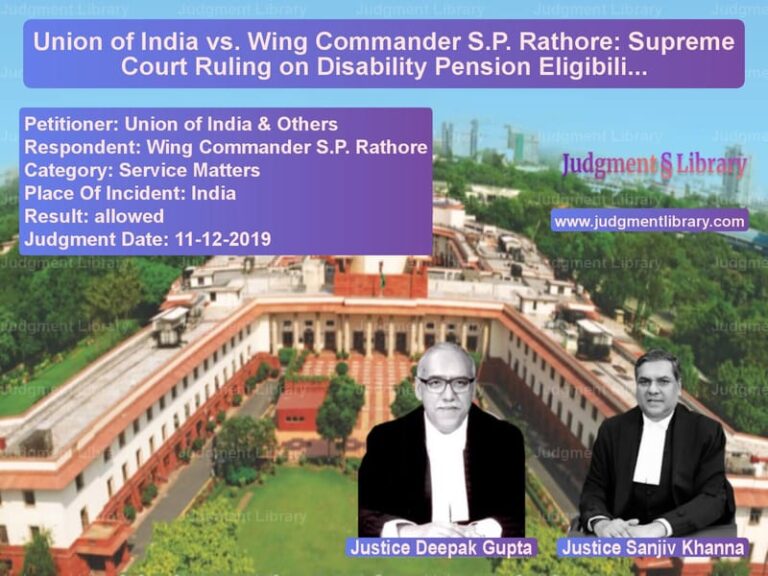Land Acquisition and Industrial Development: A Case Study on the KIADB Act and Public Purpose
This judgment explores the constitutional and legal issues surrounding the land acquisition process under the Karnataka Industrial Areas Development Act (1966 Act) and its application for industrial development. The case brings to the forefront questions on procedural compliance, public purpose, and environmental clearance in the context of land acquisition for industrial projects. The proceedings involve multiple appeals concerning the legality of land acquisition for two prominent steel plants, MSPL Limited and AISL, in the state of Karnataka. The land acquisition process was challenged on the grounds of improper procedure, lack of environmental clearance, and failure to demonstrate a public purpose.
Background of the Case
The dispute began when land was acquired for the establishment of iron ore pelletisation and integrated steel plants. MSPL Limited and AISL were the two companies involved in the acquisition process. Landowners objected to the acquisition on multiple fronts, claiming that the process was flawed and that the land was acquired not for a public purpose but for the benefit of private industrialists. The landowners filed writ petitions challenging the notifications issued under Sections 1(3), 3(1), and 28(1) of the Karnataka Industrial Areas Development Act, 1966, which they claimed were issued improperly and without proper procedure.
Legal Arguments of the Petitioners
The petitioners, who were landowners, argued that the acquisition was not in compliance with the statutory provisions of the 1966 Act and the principles laid down under the Constitution of India. They contended that the land acquisition notifications were issued without following the proper procedural steps, such as obtaining the necessary environmental clearance. The petitioners also questioned the acquisition’s legitimacy, claiming that it was done for the benefit of private companies rather than for a genuine public purpose, which is a requirement for land acquisition under the law.
Additionally, the petitioners highlighted that a significant portion of the landowners (90%) had accepted compensation, yet a small fraction, owning less than 10% of the total land, had challenged the acquisition. The landowners further argued that the process was rushed and lacked transparency, leading to the illegal dispossession of their land.
Arguments from the Respondents
In contrast, the respondents, representing the State of Karnataka and the Karnataka Industrial Area Development Board (KIADB), defended the land acquisition process. They argued that the acquisition was carried out in accordance with the provisions of the 1966 Act, which empowers the State to acquire land for the development of industrial areas. They also stated that the process was approved by the State High-Level Clearance Committee (SHLCC) and other relevant authorities, including the Land Audit Committee and the KIADB, which all followed the prescribed statutory procedures.
The respondents further argued that the development of industrial areas was a legitimate public purpose, which justified the acquisition. They emphasized that the approval of the project by SHLCC and the subsequent issuance of notifications under the 1966 Act were in compliance with the law. Furthermore, the respondents pointed out that the environmental clearance was obtained as per the requirements of the law and that the process of acquiring land for industrial purposes was a standard procedure to promote economic development and provide employment opportunities in the region.
Supreme Court’s Judgment
The Supreme Court, while deliberating on the case, focused on the key issues of procedural compliance, public purpose, and environmental clearance. The Court held that the acquisition process was vitiated due to non-compliance with the procedural requirements under the 1966 Act, particularly the failure to obtain prior environmental clearance before initiating the acquisition. The Court emphasized the importance of strict adherence to procedural safeguards in land acquisition proceedings, especially when they involve private companies and agricultural landowners.
The Court also addressed the issue of whether the acquisition could be deemed for a public purpose. While recognizing the need for industrial development, the Court ruled that land acquisition for the benefit of a private company without fulfilling all statutory requirements, such as environmental clearance, could not be justified as serving a public purpose. The Court observed that land acquisition for private industrialists could only be valid if it complied with all procedural requirements and served a legitimate public interest, such as the development of industrial estates that benefit the wider community.
One of the major conclusions of the Court was that the acquisition of land for a single company did not automatically render the acquisition invalid, provided that the acquisition was carried out for a legitimate public purpose and in compliance with the relevant provisions of the law. However, the Court found that the acquisition process had significant irregularities, including the lack of a proper environmental clearance, and quashed the notifications under Sections 1(3), 3(1), and 28(1) of the 1966 Act.
Key Points of the Judgment
- The acquisition of land for private companies must adhere to statutory requirements, including obtaining environmental clearance.
- The public purpose of land acquisition must be clearly demonstrated, particularly when the acquisition is for the benefit of a private company.
- The Court emphasized the need for strict compliance with procedural safeguards in land acquisition proceedings to protect the rights of landowners.
- The Court quashed the land acquisition notifications, highlighting that the process was flawed due to non-compliance with the law.
- The Court also addressed the issue of whether a small fraction of landowners could challenge the entire acquisition, ultimately ruling that the challenge by a small number of landowners did not justify quashing the entire acquisition process.
Conclusion
The Supreme Court’s judgment in this case sets important precedents for land acquisition processes, particularly when it comes to the development of industrial areas. The ruling emphasizes the need for adherence to statutory requirements, such as obtaining environmental clearance, and ensures that land acquisition for industrial purposes is carried out in a transparent and lawful manner. The Court’s judgment highlights the importance of protecting the rights of landowners and ensuring that the public purpose behind such acquisitions is clearly established.
Petitioner Name: MSPL Limited and AISL.Respondent Name: State of Karnataka and KIADB.Judgment By: Justice Vikram Nath, Justice Hemant Gupta.Place Of Incident: Karnataka.Judgment Date: 11-10-2022.
Don’t miss out on the full details! Download the complete judgment in PDF format below and gain valuable insights instantly!
Download Judgment: mspl-limited-and-ais-vs-state-of-karnataka-a-supreme-court-of-india-judgment-dated-11-10-2022.pdf
Directly Download Judgment: Directly download this Judgment
See all petitions in Contract Disputes
See all petitions in Property Disputes
See all petitions in Damages and Compensation
See all petitions in Landlord-Tenant Disputes
See all petitions in Specific Performance
See all petitions in Judgment by Vikram Nath
See all petitions in Judgment by Hemant Gupta
See all petitions in allowed
See all petitions in supreme court of India judgments October 2022
See all petitions in 2022 judgments
See all posts in Corporate and Commercial Cases Category
See all allowed petitions in Corporate and Commercial Cases Category
See all Dismissed petitions in Corporate and Commercial Cases Category
See all partially allowed petitions in Corporate and Commercial Cases Category

